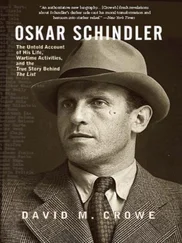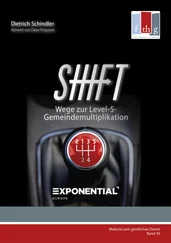But in its early months in Cracow, it seemed a benign force. Leopold Pfefferberg could stand as a token of the ambiguity of being a member. When all education for Jews, even that organized by the Judenrat, was abolished in December 1940, Poldek had been offered a job managing the waiting lines and keeping the appointment book in the Judenrat housing office. It was a part-time job, but gave him a cover under which he could travel around Cracow with some freedom. In March 1941, the OD itself was founded with the stated purpose of protecting the Jews entering the Podgórze ghetto from other parts of the city. Poldek accepted the invitation to put on the cap of the OD. He believed he understood its purpose—that it was not only to ensure rational behavior inside the walls but also to achieve that correct degree of grudging tribal obedience which, in the history of European Jewry, has tended to ensure that the oppressors will go away more quickly, will become forgetful so that, in the interstices of their forgetfulness, life may again become feasible.
At the same time Pfefferberg wore his OD cap, he ran illegal goods—leatherwork, jewelry, furs, currency—in and out of the ghetto gate. He knew the Wachtmeister at the gate, Oswald Bosko, a policeman who had become so rebellious against the regime that he let raw materials into the ghetto to be made up into goods—garments, wine, hardware—and then let the goods out again to be sold in Cracow, all without even asking for a bribe.
On leaving the ghetto, the officials at the gate, the lounging schmalzownicks, or informers, Pfefferberg would take off the Judaic armband in some quiet alley before moving on to business in Kazimierz or the Centrum.
On the city walls, above fellow passengers’ heads in the trolleys, he would read the posters of the day: the razor-blade advertisements, the latest Wawel edicts on the harboring of Polish bandits, the slogan “JEWS—LICE—TYPHUS,” the billboard depicting a virginal Polish girl handing food to a hook-nosed Jew whose shadow was the shadow of the Devil. “WHOEVER HELPS A JEW HELPS SATAN.” Outside groceries hung pictures of Jews mincing rats into pies, watering milk, pouring lice into pastry, kneading dough with filthy feet. The fact of the ghetto was being validated in the streets of Cracow by poster art, by copywriters from the Propaganda Ministry. And Pfefferberg, with his Aryan looks, would move calmly beneath the artwork, carrying a suitcase full of garments or jewelry or currency.
Pfefferberg’s greatest coup had been last year, when Governor Frank had withdrawn 100- and 500-złoty notes from circulation and demanded that existing notes of those denominations be deposited with the Reich Credit Fund. Since a Jew could exchange only 2,000 zł., it meant that all notes held secretly—in excess of 2,000 and against the regulations—would no longer have any value. Unless you could find someone with Aryan looks and no armband who was willing on your behalf to join the long lines of Poles in front of the Reich Credit Bank.
Pfefferberg and a young Zionist friend gathered from ghetto residents some hundreds of thousands of złoty in the proscribed denominations, went off with a suitcase full of notes, and came back with the approved Occupation currency, minus only the bribes they’d had to pay to the Polish Blue Police at the gate.
That was the sort of policeman Pfefferberg was. Excellent by the standards of Chairman Artur Rosenzweig; deplorable by the standards of Pomorska.
Oskar visited the ghetto in April—both from curiosity and to speak to a jeweler he had commissioned to make two rings. He found it crammed beyond what he had imagined—two families to a room unless you were lucky enough to know someone in the Judenrat. There was a smell of clogged plumbing, but the women held off typhus by arduous scrubbing and by boiling clothes in courtyards. “Things are changing,” the jeweler confided in Oskar. “The OD have been issued truncheons.” As the administration of the ghetto, like that of all ghettos in Poland, had passed from the control of Governor Frank to that of Gestapo Section 4B, the final authority for all Jewish matters in Cracow was now SS Oberführer Julian Scherner, a hearty man of somewhere between forty-five and fifty, who in civilian clothes and with his baldness and thick lenses looked like a nondescript bureaucrat. Oskar had met him at German cocktail parties. Scherner talked a great deal—not about the war but about business and investment. He was the sort of functionary who abounded in the middle ranks of the SS, a sport, interested in liquor, women, and confiscated goods. He could sometimes be discovered wearing the smirk of his unexpected power like a childish jam stain in the corner of the mouth. He was always convivial and dependably heartless. Oskar could tell that Scherner favored working the Jews rather than killing them, that he would bend rules for the sake of profit, but that he would fulfill the general drift of SS policy, however that might develop.
Oskar had remembered the police chief last Christmas, sending him half a dozen bottles of cognac. Now that the man’s power had expanded, he would rate more this year.
It was because of this shift of power—the SS becoming not simply the arm of policy but the makers of it as well—that beneath the high June sun the OD was taking on a new nature. Oskar, merely by driving past the ghetto, became familiar with a new figure, a former glazier named Symche Spira, the new force in the OD. Spira was of Orthodox background and by personal history as well as temperament despised the Europeanized Jewish liberals who were still found on the Judenrat Council. He took his orders not from Artur Rosenzweig but from Untersturmführer Brandt and SS headquarters across the river. From his conferences with Brandt, he returned to the ghetto with increased knowingness and power. Brandt had asked him to set up and lead a Political Section OD, and he recruited various of his friends for it. Their uniform ceased to be the cap and armband and became instead gray shirt, cavalry breeches, Sam Browne belt, and shiny SS boots.
Spira’s Political Section would go beyond the demands of grudging cooperation and would be full of venal men, men with complexes, with close-held grudges about the social and intellectual slights they’d received in earlier days from respectable middle-class Jewry.
Apart from Spira, there were Szymon Spitz and Marcel Zellinger, Ignacy Diamond, David Gutter the salesman, Forster and Grüner and Landau. They settled in to a career of extortion and of making out for the SS lists of unsatisfactory or seditious ghetto dwellers.
Poldek Pfefferberg now wanted to escape the force. There was a rumor that the Gestapo would make all OD men swear an oath to the Führer, after which they would have no grounds for disobedience. Poldek did not want to share a profession with gray-shirted Spira or with Spitz and Zellinger, the makers of lists. He went down the street to the hospital at the corner of Wegierska to speak to a gentle physician named Alexander Biberstein, the official physician to the Judenrat. The doctor’s brother Marek had been that first president of the Council and was presently doing time in mournful Montelupich prison for currency violations and attempting to bribe officials.
Pfefferberg begged Biberstein to give him a medical certificate so that he could leave the OD. It was difficult, Biberstein said.
Pfefferberg did not even look sick. It would be impossible for him to feign high blood pressure. Dr. Biberstein instructed him in the symptoms of a bad back. Pfefferberg took to reporting for duty severely stooped and using a cane.
Spira was outraged. When Pfefferberg had first asked him about leaving the OD, the police chief had pronounced—like a commander of some palace guard —that the only way out was on your shield. Inside the ghetto, Spira and his infantile friends were playing a game of Elite Corps. They were the Foreign Legion; they were the praetorians.
Читать дальше












